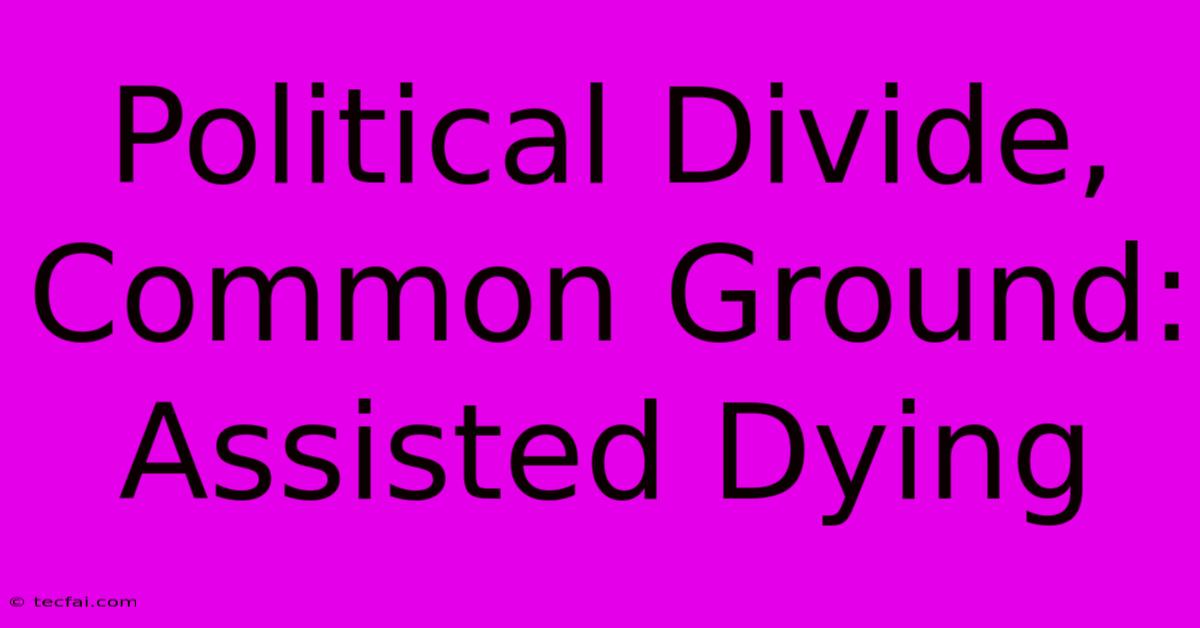Political Divide, Common Ground: Assisted Dying

Discover more detailed and exciting information on our website. Click the link below to start your adventure: Visit Best Website tecfai.com. Don't miss out!
Table of Contents
Political Divide, Common Ground: Assisted Dying
The issue of assisted dying, or physician-assisted suicide (PAS), carves a deep chasm through the political landscape. It's a topic rife with passionate opinions, deeply held beliefs, and complex ethical considerations, making it a battleground for fiercely debated ideologies. Yet, beneath the surface of this political divide, surprising common ground exists, suggesting a path toward a more nuanced and potentially unifying approach.
The Core Tensions: A Clash of Values
The debate around assisted dying often boils down to a clash between fundamental values. On one side, proponents emphasize autonomy and self-determination. They argue that individuals facing unbearable suffering and terminal illness should have the right to choose how and when their lives end. This perspective often aligns with liberal and libertarian viewpoints that prioritize individual liberty and freedom of choice.
Conversely, opponents often cite sanctity of life and religious beliefs as their primary arguments. For many, the deliberate ending of a human life, regardless of circumstances, is morally unacceptable. This stance frequently resonates with conservative and religious groups who see the preservation of life as a paramount ethical imperative. Concerns about vulnerable populations being coerced into assisted dying, potential slippery slopes, and the role of medical professionals also contribute to the opposition's arguments.
Beyond the Binary: A Spectrum of Perspectives
It's crucial to acknowledge that the debate is far more complex than a simple "for" or "against" binary. Within both camps, there’s a wide spectrum of opinions. For instance, some supporters of assisted dying advocate for strict regulations and safeguards, including thorough psychological evaluations and multiple consent processes. Similarly, some opponents may accept assisted dying in specific, limited circumstances, such as for individuals with terminal illnesses and unbearable pain who have expressed a clear and consistent wish to die.
Finding Common Ground: Areas of Potential Consensus
Despite the apparent polarization, several areas of potential consensus are emerging:
-
Improved Palliative Care: Both sides largely agree on the importance of high-quality palliative care. Providing comprehensive pain management, emotional support, and spiritual guidance can significantly alleviate suffering and reduce the desire for assisted dying. Investing in and expanding access to such care is a non-partisan goal that could potentially lessen the demand for PAS.
-
Advance Care Planning: Supporting robust advance care planning allows individuals to articulate their wishes regarding end-of-life care, including whether or not they would consider assisted dying under specific circumstances. This empowers individuals to exercise autonomy while providing clarity for their loved ones and healthcare providers.
-
Protecting Vulnerable Populations: Addressing concerns about coercion and ensuring that vulnerable individuals are not pressured into assisted dying is critical. This requires stringent safeguards, robust oversight mechanisms, and public education campaigns. Finding common ground on safeguarding vulnerable individuals is achievable, regardless of the overall stance on assisted dying.
-
Transparency and Accountability: Establishing clear, transparent, and accountable legal frameworks for assisted dying, where it's permitted, is essential. This could involve independent oversight bodies, detailed record-keeping, and regular audits to ensure the process is ethically sound and free from abuse.
The Path Forward: A More Nuanced Discussion
The political divide surrounding assisted dying remains significant, but it's not insurmountable. By focusing on areas of shared concern, such as improving palliative care, promoting advance care planning, and establishing robust safeguards, we can move beyond the entrenched positions and engage in a more nuanced and productive dialogue. This requires a willingness to listen, understand diverse perspectives, and recognize the shared goal of ensuring compassionate and dignified end-of-life care for all. The debate is complex, but finding common ground is not only possible, it's crucial.

Thank you for visiting our website wich cover about Political Divide, Common Ground: Assisted Dying. We hope the information provided has been useful to you. Feel free to contact us if you have any questions or need further assistance. See you next time and dont miss to bookmark.
Featured Posts
-
Gukesh Loses To Ding In Chess Opener
Nov 26, 2024
-
Walking Pneumonia Cases Climb In Lowcountry
Nov 26, 2024
-
Newcastle Vs West Ham Live Score
Nov 26, 2024
-
Longmire Departure Cox Swans Coach
Nov 26, 2024
-
Chess World Championship Ding Leads
Nov 26, 2024
